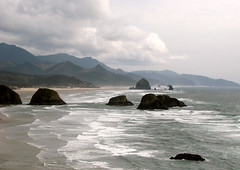 The effort to help change the world’s polluting ways is a long road that was never going to be solved overnight. However, with the help of LiveScience.com, maybe we can effectively destroy any hope of it overnight.
The effort to help change the world’s polluting ways is a long road that was never going to be solved overnight. However, with the help of LiveScience.com, maybe we can effectively destroy any hope of it overnight.
I call this story “How to Successfully Undermine Good Ideas” thanks to a recent article written over at LiveScience.com entitled “Top 10 Craziest Environmental Ideas.” And, in short, several of their “zany ideas” are possible chances for survival.
I normally don’t like to just ridicule other websites or authors; it’s not sporting, but Andrea Thompson has got me all riled up. And while in amidst her Top 10 there are some insanely zany ideas, I think she has relatively effectively attempted to screw with a few really good ideas.
The list is as follows;
10. Ban Plastic Bags and Light Bulbs
9. Cut and Cap Emissions
8. Live in Trash
7. Bury the Carbon
6. Change Your Diet
5. Keep Worms in the Kitchen
4. Fill the Air With Sulfur
3. Get the Ocean Moving and Mixing
2. Give the Ocean a Dose of Iron
1. Build Earth Some Sunglasses
Now, let’s be honest; numbers 5, 4 and 1 are just insane, if for no other reason than the last place I want worms trundling around is my kitchen. And numbers 10, 8, 6 and 2 are all just a bit too tough to pull off; seriously, how many of the men do you know are going to reduce their intake of red meat (but that doesn’t mean that they are zany ideas).
My issues were with numbers 9, 7 and 3; each idea is scientifically valid, and could help significantly. To add them to a “Craziest Ideas” list is not only insulting, it’s damaging.
I’m not going to go in to the reasons why these ideas are good, because at GO we’ve already done this for you. Hence the massive list of stories below here that you should check out! But the point of the matter is, Andrea Thompson has done a major disservice to environmental science.
More from the GO Network
10. – San Francisco Votes To Ban The Plastic Bag, Red, Green & Blue: Is It Time for a Plastic Bag R.I.P.?, California to ban the lightbulb?
9. Is Cap-and-Trade the Best CO2 Policy?, Bush’s Legacy Definitely not Climate Change
7. Lots of Room to Sequester CO2, Stop Coal, Stop Global Warming, Untapped Coal Reserves: A Bridge to Cleaner Energy Solutions?
6. Consider Cutting the Meat Out
3. Millions of Pipes to Solve Global Warming
2. Fertilizing The Ocean – Great Idea or Eco Disaster?, India to Test South Atlantic Carbon Sink in 2009
If she called them crazy or zany, she was creating controversy to employ reverse psychology to make us do our research and perpetuate these ideas. No disservice. She inspired your article.
I’m not sure that you completely read all of her list, Joshua. Not once does she actually state that any of those Top Ten Ideas are bad. Each one is clearly stated, studies are referred to, when appropriate, and the scientific pros and cons are laid out in simple form, but nothing is mis-stated, as far as I can see. Methinks that you (and many of the respondents on the site), responded overly-touchily to her use of the word “craziest”, which is not necessarily a pejorative, and I don’t believe that she was being so in her use of it.
Let me give an example of what I mean, so that those four or five who actually read these comments will know that I’m not blowing smoke. In her comment about worms in the kitchen (which is very clear, and positive about worms), she closes the item with a comment that those who just can’t stand the idea of worms in the kitchen can always keep them in the backyard. Which is what my parents do; my dad has been a vermiculturalist for a decade, but there is no way that my mother would tolerate them in the house. Very few people would; I doubt that Dad would, to be honest.
What I think has happened here is that, in order to attract attention, the author used a buzz-word that was guaranteed to be noticed, and it was. Unfortunately, those who should know better took it as a negative, and apparently didn’t read the whole thing. Which, of course, is the problem with Humanity as a group; we just don’t look at everything around us. It does the eco-community no good at all when *we* can’t be any better than those we are trying to change 🙁